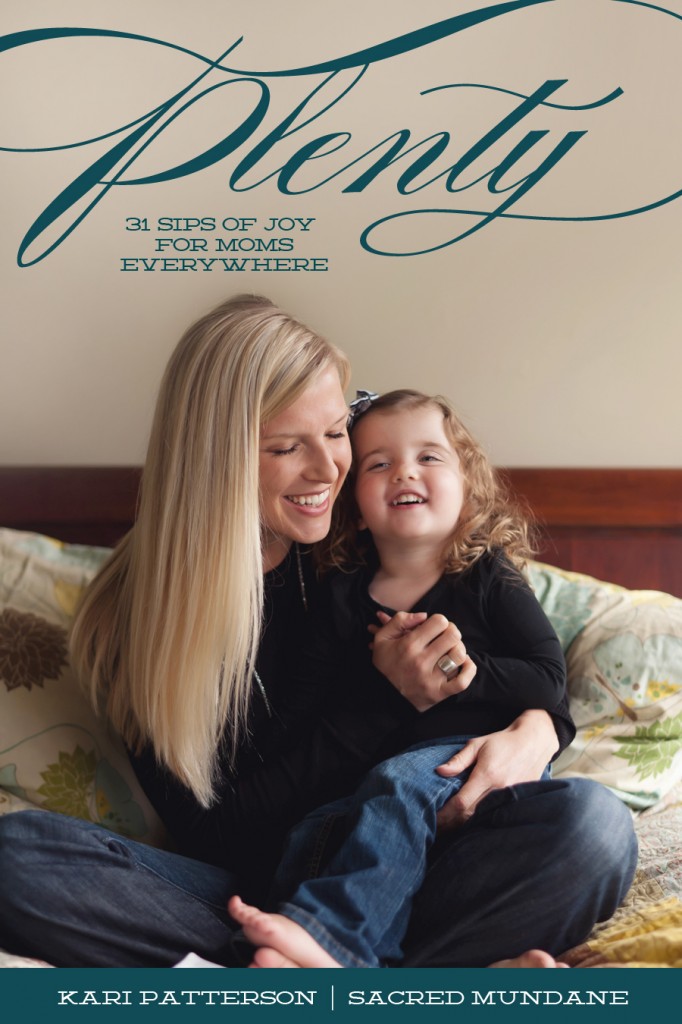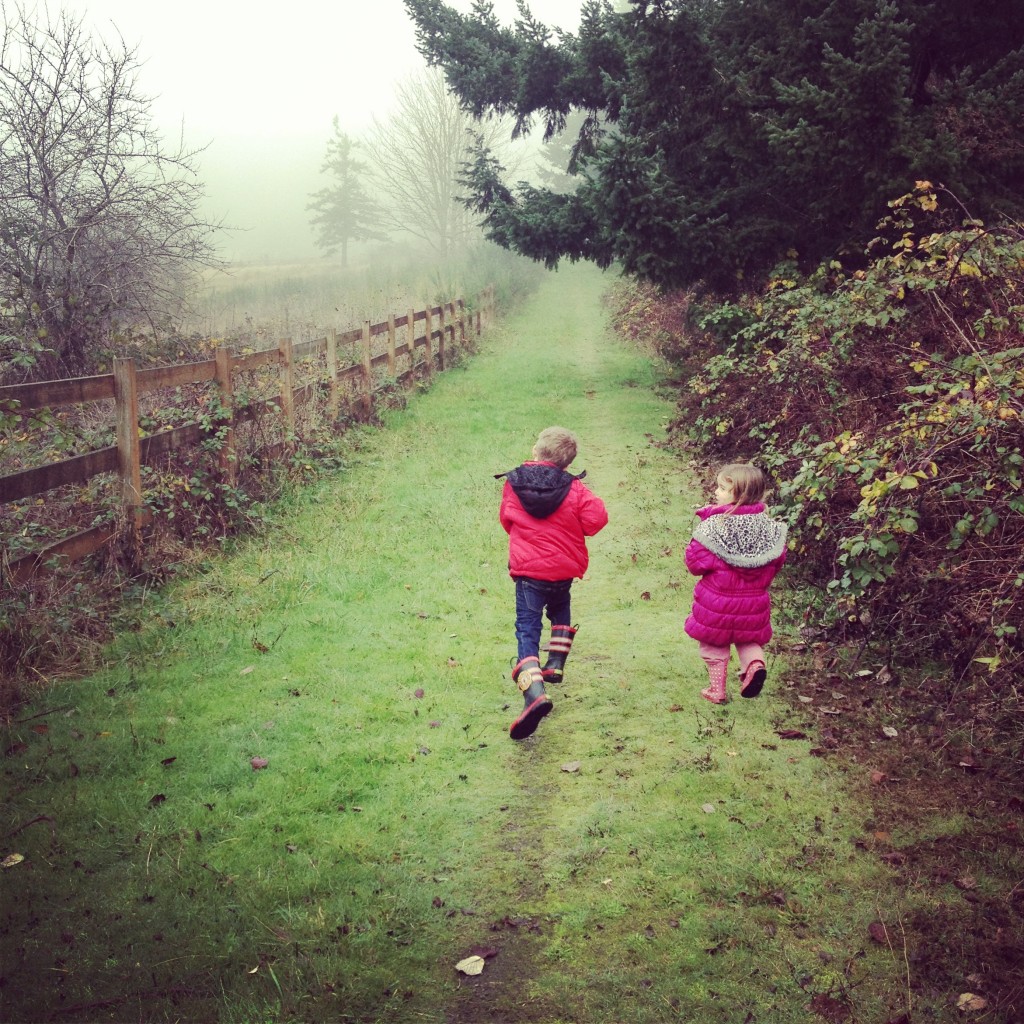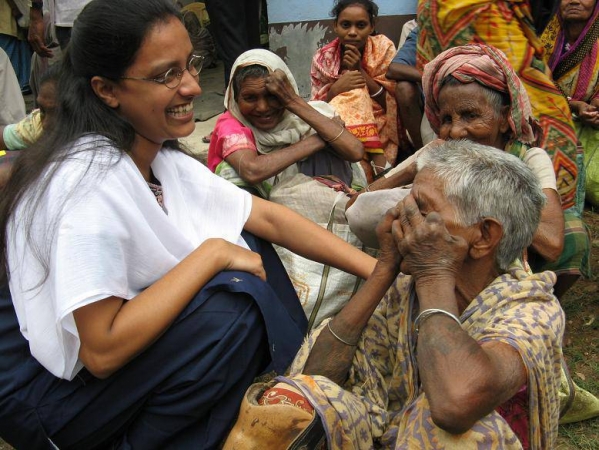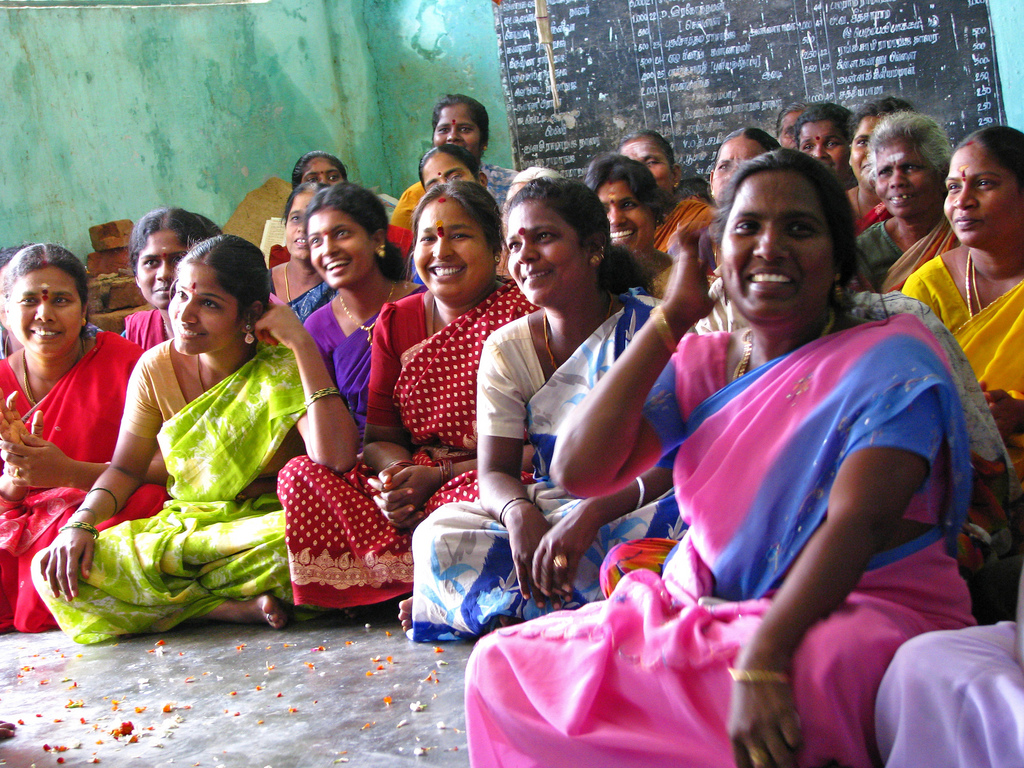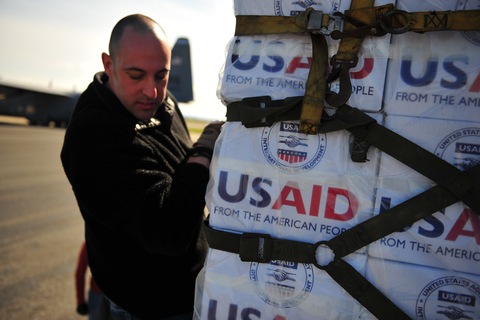Look both ways before crossing the year
Last year, Jeff asked me to write this little Christmas devotional, on fear. I drafted it up and emailed it to him.
“Great,” He replied. “Let’s each write up some discussion questions to go with it.” Super. I scratched out some thoughts, but before I clicked send his own set of questions popped up in my inbox. His questions were these:
1. Can you think of a time this past year when you were afraid? How did you respond and how did it turn out?
2. How can you see ways that God is delivered you from fear? What is one area where you used to be afraid and now are not?
Fair enough, right? However, my questions were these:
1. What unknown in the future is making you afraid of right now? Is there anything looming ahead that’s causing you anxiety?
2. How can you take that thing and go to God in prayer? What would it look like, practically, to trust Him with your future in this area?
See the difference? So small, yet so profound.
My man is a past-oriented person. I, a future-oriented.
He actually pointed this out to me several months ago. I narrowed my eyes and listened, skeptical. Now I see it everywhere; we’re really ridiculous creatures.
- He loves to hold onto things. He keeps old clothes, pictures, books. For him they hold memories of the past.
- I’m a ruthless purger. Haven’t worn it in a year? How about 6-weeks? Close enough. Toss it out. Kids haven’t played with it? Toss it out. Keep moving forward. Make room for new things we’ll inevitably get in the future.
- He takes pictures. Remember the past.
- I never take pictures. Keep moving forward!
- He never finishes the carton/bottle/box/bag/plate. Leave a little bit in there and keep it in the fridge/cupboard.
- I drink/eat whatever little bit is left just so I can toss out the container and move on!
- Jeff keeps receipts for decades.
- I throw them away as soon as I get home.
- Jeff loves studying history.
- I love studying things that motivate me toward a better tomorrow.
- The kicker? I have a dry-erase calendar on my fridge. I realized that I would erase every single day as soon as it was over, and would start over writing the next month in the blank spaces, so that at all times the calendar was all future dates. No record of what I’d done. Only un-lived days.
- He doesn’t have a dry-erase calendar because he’d never erase it.

Do you see? We really are all wired a little differently. Neither is better, but certainly very different. Thankfully, we’re learning from each other. Jeff is learning to throw away the ratty gym shorts and I’m learning to reflect, look back and bit and learn from yesterday before moving onto tomorrow.
And that’s what we need as we cross into 2013.
Some of us, perhaps, are prone to gaze intently at the future. We’re ready, excited, climbed on board and racing toward another new year. Some of us, on the other hand, want to ride backwards on the train. can we just look behind and remember all the good. Reflect. Review?
We need both. So as we cross the year, perhaps we’d be blessed by setting aside some time for looking both ways? I’m looking forward to doing this tomorrow (haha! I even write with future-oriented language!), with Jeff, as we unpack boxes all day (yes, we moved this weekend!). We’ll be asking ourselves these:
- What was your greatest victory this past year?
- What surprised you about the direction of your life this past year?
- What was harder than you thought it’d be?
- What was way better than you’d ever imagined?
- In what way have you changed from January 2012 to December 2012?
- What are you hoping to see God do in you this year?
- If you could choose one thing to change about yourself or your habits this year what would it be?
- What fruit of the Spirit will you focus on this year?
- What spiritual discipline (prayer, reading Word, fasting, fellowship, service) would you like to grow in this year?
- What current relationship would you like to invest in this year?
Just a few ideas to get started. Are you more past-oriented or future oriented in your thinking? I’m curious … Enjoy looking both ways as you cross into 2013, and I pray for God-inspired and God-initiated ideas, dreams, and reflections. {Thanks for reading.}
Week's end with thanks
- First snow day.
- Seeking joy.
- Persevering.
- God’s funny timing.
- Celebrating my precious firstborn. Six-years-old!
- Making adjustments.
- Overwhelmed by the tremendously generous enthusiasm and response to Friday’s e-book release. Almost 3,000 precious souls have received Plenty. I thank you so, so much. I’m overwhelmed with thankfulness and praying that it can be an encouragement to each one of you as you have been to me. (and just in case you missed it, it’s still available here!)
- My husband, who gives and gives and gives.
- Danielle, who does the same.
- Celebrating my dear Janae’s brand new baby girl! Cheering and amazed that we’ll now have children who have the same birthday!
- A man who leads, loves … and vacuums.
- Brother, sister-in-law, neice and nephew coming into town today!
- Momma-in-law coming into town tomorrow!
- Christmas celebrations.
- LEGOs everywhere.
- Boxes everywhere, messes everywhere, chaos everywhere, but the sunlight streaming through the windows and blue sky smiling and every single day a gift. Thank you, Father!
- Teaching children.
- Hard days that make us stronger.
- His love that holds us up.
Unplugging today for Family Day. Thank you again for your support and enthusiasm for Plenty. Bless you, and thank you for reading!
Plenty {FREE e-book today only — the perfect gift for moms everywhere}
Fear.
Everywhere I look these days I see it. In the aftermath of recent shootings I see it settle over people like a thick, heavy blanket, pushing down spirits and dampening joy. I see it causing people to lash out at each other. I see it in Facebook statuses and comments. I see it making mothers react, knee-jerk, and cower, afraid of sending their children back into the world. I see it fueling frenzies around the world in response to the end-of-the-world-today prediction. I see it lingering even in laughter, the lightness of the season a thin veil shrouding a fear about the future.
Sometimes I see it in the mirror.
Fear is our enemy, sisters of faith. Because fear causes us to believe, There won’t be enough. There won’t be enough protection. There won’t be enough love for me. There won’t be enough safety and security. There won’t be enough money. There won’t be enough peace. There won’t be enough time in my day. There won’t be enough strength for me to face this trial. There just won’t be enough today.
That’s the lie we face.
Jeff has been asking me, “What do you want your readers to know this year? What one message do you want them to grasp in 2013?”
It’s this:
There is plenty.
There will always be plenty to worry about. Not just guns. If we really knew all the dark forces at work every single day in our world we’d go crazy.
There will always be plenty to do. Our to-do lists will always be longer than our leg, and we will never “arrive” and be “caught up.”
But, there is also plenty for us.
There is plenty of grace to forgive every fault. There is plenty of mercy to help in time of need. There is plenty of love to cover a multitude of sins. There is plenty of wisdom given to us whenever we ask. There is plenty of courage to make us brave for the battle. There is plenty of strength to help us stand. There is plenty of power for life and godliness.
There is plenty of joy in God’s presence.
Friends, and specifically you moms, I pray you would know today There is plenty. With Him there is no lack.
And in step with this, I’m thrilled today to offer you my very first E-book entitled,
Plenty: 31 sips of joy for moms everywhere.
This 31-day devotional is a compilation (re-edited for this book) of 2012’s best Mommyhood posts. Posts such as This Beautiful Waste and Because sometimes, we just can’t remember have been re-edited and accompanied by a Today feature — ideas for living out these truths right now. What better way to start off the new year than by spending the first 31 days filling your mind and heart with truth, reminding yourself there is PLENTY for each day?
And, for those of you faithful friends who are here today (December 21st) Plenty is FREE on Amazon all day long!
Consider today getting five or ten copies to slip into the email inboxes or onto the Kindles or iPads of all your favorite mommy-friends? Delivery is immediate, so they can have their special book just in time for Christmas. This is a small, FREE way to give the gift of joy and truth to those precious mamas this Christmas. CLICK HERE to get Plenty FREE on Amazon. (It will then be $0.99 through Christmas Day, and $2.99 after that. Don’t worry, you know I’m cheap so the book will be as well!)
If you’re getting the book free today (and like it) would you please consider “like”-ing it on Amazon, writing a Review, or sharing this post on Facebook, Pinterest, or Twitter (buttons below!)? Thank you so much for sharing the love so plenty of Mamas can be encouraged as they begin the new year.
THANK YOU dear friends, for your constant love and support. May the next five days be full of anticipation and joy as we celebrate our Savior’s birthday. Thanks for reading.
Gift-Giving Guide 2012: Final Recommendations
This is the final post in our Gift-Giving Guide series by Kris Zyp. Read posts one, two, and three here. Enjoy!
As we finish this series, here are several recommendations and final comments.
Bread for the World –
This is a distinctly Christian organization with strong focus on Biblically driven values, and seems to be very productive and influential. I wish that they were more narrowly focused on international issues. While they do advocate on international issues, they spend a lot of their focus on domestic poverty that has lesser returns. http://bread.org/
Micah Challenge –
This is a UK-based organization, that is also a Christian organization (their name comes from Micah 6:8). I love their strong focus on international issues, advocacy for the millennium development goals, which cover the range of important poverty issues. They have also done a good job focusing on injustices that have received relatively little attention, including tax havens, and their impact on developing countries. There were chosen by Live 58 as their advocacy organization to support. However, this is a UK-based organization, and I haven’t found much evidence of their influence in US policy. http://www.micahchallenge.org/
Jubilee –
This organization is based on the Biblical principle of Jubilee, and thus focuses specifically on the issue of debt injustice. Third world debt is well-known to be a major factor in keeping countries in poverty, and this movement’s focus on this issue has helped them to have influence in rather spectacular victories in debt cancellation, freeing billions of dollars for development. http://www.jubileeusa.org
It is also worth noting that while I have been primarily doing comparison in financial terms for consistency, in comparison to other efforts, you can easily have a powerful impact in advocacy with your own time and effort and minimal training. Becoming an effective missionary can take years of theological training and language acquisition, other aid workers often require similar levels of training before they become fully capable workers. On the other hand, with a little bit of research you can instantly start emailing and calling your representatives to affect change.
In addition, there are many aspects of fighting poverty aren’t simply matters of injecting more money; sustainable change really requires policy changes in areas like trade injustice, debt relief, tax havens, immigration constraints that cost the poor billions of dollars every year.
Gift Matching
Gift matching is another catalyst, encouraging others to give to cause by increasing the incentives and potential to attract other donors. This is a great strategy for those that are well-researched and have significant funds to offer. Note, this generally requires some coordination with charities to start such an offer. You can also take advantage of gift matching with donations that have matched offers. Many charities offer multiplicative donations, based on existing donor offers for matching. However, be aware that the actual impact of gift matching can easily be overrated. Typically the donor that offers that matching funds has minimum and/or maximum amounts and the offered matching funds may be released by other donors regardless of whether you give, making the multiplication level an illusion in many cases.
Some Comments on Projects I Didn’t Recommend
Fair trade or charity-connected products
It may sound surprising that someone who writes about social justice issues would not be a fan of fair trade and charity-connected products (buying a product where some money or item is donated to those in need), but these products have simply not demonstrated cost effective benefits to others that are anywhere close to the other recommendations I have made. Fair trade has very limited impact, and can create market distortions that are actually counter-productive. Charity-connected products combine marketing and charity in ways that typically are sub-optimal on both counts.
Now if you were really faced with the isolated decision to buy a fair trade produce vs a standard product, than yes, buy fair trade. But, this ignores the alternate opportunity cost. If you are truly interested in doing the most good, buying a cheaper product, and giving the difference to a high quality charity is almost always the most beneficial approach.
There is a caveat. Buying certain products can have a side-effect in raising awareness. While the economic benefit may be dubious, buying a product that raises awareness of poverty or trade injustices can further the social movements that working towards real policy reforms that do make a difference. I wrote about this in greater depth here: http://thezyps.com/2012/06/14/trade-injustice/. Also, the one decision you can make in choosing between similar products is simply to prefer products from developing countries (even just choosing China over US products is better for fighting poverty).
Animals
Making donations for the purchase of livestock for poor families is common way to contribute. While this is a good idea, and has benefits, there is a lack of any evidence that the benefits are big or long-lasting as the other projects recommended. The complications and ineffectiveness of giving animals has been expressed with more detail by Givewell:http://blog.givewell.org/2009/12/27/gifts-of-livestock-eg-heifer-international/
Still there are a couple of reasons why giving animals is not bad: such donations can be a good entry way to encourage people to start giving (with a gift that appears quite tangible). There is another bright side to giving animals, that may seem surprising: most charities involved in this type of work don’t actually spend most of the donated money on animals. This may be disturbing, but the reality they often spend most of the money on the more important and beneficial details of community development and education that are far productive than the animal gifts themselves.
Making Your Own Evaluations
I have made several recommendation, but you may want to make some of your own assessments. Hopefully these recommendations demonstrate some key ideas of researching the cost and benefits of different approaches. In addition I wanted to share a couple more ideas for assessment:
Often people use program expenditure percentage to evaluate an organization. This is a natural inclination since it is one of the few objective measures that we can really directly compare between charities. However, it is also one of the poorest indicators of the value of the work a charity is doing. First, the difference between the different activities carried out by charities can easily vary in efficacy by hundreds of percentages points, thus the different in program expenditure is usually negligible in comparison. Second, non-program expenditures can be very valuable in growing in charity. Spending more on marketing doesn’t necessarily indicate ineffectiveness, it can easily prove to be an investment in the future of the charity that will pay off in the years to come (charities frequently vary greatly from year to year in percentages).
Instead, If you really want to look at a simple objective numerical indicator, here is what I recommend: look at how much of their funds come from foundations. The unfortunate reality is that success in acquiring funds from individuals is based on the quality of marketing, how well a charity tells it stories, and has little relation to the actual quality of their work. Foundations, on the other hand, exist to make more in-depth evaluations. Foundations pour through statistics, assessing the efforts, sometimes do interviews and read papers on different programs. Therefore foundations have a huge advantage in accurately directing their funds towards organizations that are actually doing good work. While it is not always true, in general, organizations funded by individuals are good at marketing, programs funded by foundations are good at helping the poor.
The most effective giving is directed to those in the deepest global poverty. Not only is it a morally logical to help those in greatest need, it also is most effective. Numerous factors like exchange rates and opportunity for impact, and combine to make dollars spent internationally towards developing countries result in the greatest benefit (see http://thezyps.com/2010/09/20/international-giving/ for more on this).
I hope this giving guide will provide some useful insights and suggestions for you, as you look to obey the Biblical call to help the poor, bringing them the greatest benefits, driven by love that looks to the interests and needs of others. Thank you for reading! {And thank you, Kris, for writing!}
What Mary Didn't Do …
 Do you remember being 13? I remember experiencing a common teen-girl behavior: freaking out. I believe all teen girls do this often — triggered by any variety of things ranging from a zit to a stolen boyfriend. Chalk it up tor hormones or whatever you like, but freaking out is the norm at 13. (Or 30 for some … but that’s another issue.)
Do you remember being 13? I remember experiencing a common teen-girl behavior: freaking out. I believe all teen girls do this often — triggered by any variety of things ranging from a zit to a stolen boyfriend. Chalk it up tor hormones or whatever you like, but freaking out is the norm at 13. (Or 30 for some … but that’s another issue.)
Not for Mary. If anyone had cause to freak out it was her. She is nine months pregnant with the Son of God, still enduring ridicule from all sides, but probably holed up her in her home nesting like crazy, getting the nursery ready and having everything prepared. We who have had babies know that crazy-nesting period when we can’t shampoo the carpets enough times and can’t make enough gallons of soup to freeze before baby’s arrival. We’re nuts, all of us.
But just as she’s about to bring baby boy into the world, all the plans change:
Road trip.
And not just any road trip: a donkey-riding roadtrip of almost 100 miles. Oh for the love! Can you imagine? I could hardly walk up the stairs at 9 months pregnant, and this little waif of a thing was trotting across Israel about ready to burst. This girl is amazing.
But that’s not it. Sure, she’s thinking, surely there will be a nice hotel waiting for us when we get there. One of those special doula birthing suites with a Jacuzzi tub. Nope. No room.
How about a barn?
I’m sorry, ladies, but can you stinkin’ imagine this??!! We think that the childbirth nightmare is not making it to the hospital in time and giving birth in the car. No … this is the childbirth nightmare. leaning against a hay bale while pushing out your baby, then lying him in a feed trough for his first night of sleep. Good grief.
This was God’s plan. Would Mary freak out?
No. She was calm, cool, and collected. No epidural. No Jacuzzi tub. No nothing. Every plan changed. Nothing was as she expected. There may have been tears, I can only imagine she was humanly hormonal, but her cries weren’t loud enough to make it onto the page.
She must have wept quietly. She must have talked to herself instead of listening to herself. Must have chosen to submit her emotions to the rule of Christ — who she held in her arms.
She was the first to bow the knee. The first to submit to His plan. And the result was a calm, cool, collected first-time mother who cradled the glory of God in her very arms. Why? She knew her God.When all is out of control, nothing is out of His control.
Do we remember this when all is spinning out of control? Nothing is out of His control.
:: Mary kept confidence. Besides freaking out, the other behavior commonly known to teen girls is called “blabbermouth syndrome.” Yes, that is, there is no gate on that beautiful mouth and so everything comes out. Again, some girls never outgrow this … but that’s another topic.
While Mary was entrusted with the Savior, she was also entrusted with a Secret. As God gradually revealed the magnificent truth about this God-child, she was given a first-hand glimpse of the miraculous Rescue Mission her very Son would spearhead.
Would she tweet it? Blog about it? Put it all over Facebook?
Could she be entrusted to keep quiet? To hold the truth in confidence, knowing that God would unfold His plan at the appropriate time? She did. When the shepherds shared with Mary the amazing news that had been told them by the heavenly host, what did she do?
“But Mary treasured up all these things, pondering them in her heart.” (2:19)
Where did she treasure them and ponder them? In the quiet of her own heart. And then, as Jesus grew and revealed in His own words more about His mission, that He must be in His father’s house, once again,
“she treasured up all these things in her heart” (2:51)
God’s glorious gospel-plan depended on the discretion of a teenage girl. It wasn’t time to blab about her boy.
Mary wasn’t called to be a prophet, just a mom.
Would she quietly be faithful to her task? She was. And in God’s beautiful time, the Rescue Mission unfolded, the glorious love story of a Groom seeking a Bride.
Here’s the cool thing for us: We will never be called on to give birth to the Son of God (that seat’s taken!) but we will all be called on for some mission of God. We each have a unique calling on our lives. Will we follow through? Is God’s glory safe with us?
Will we be courageous when everything is scary? Will we stand in confidence with our future looks unsure. Will we stay calm, cool, and collected even when everything’s spinning out of control? And will we keep confidence, showing discretion at the appropriate times. The qualities that Mary needed for her mission are the same qualities we need for whatever mission God has for us.
And He does have a mission for us. He has good works, prepared in advance for us (Eph 2:10). How will we respond? I’m grateful for a girl named Mary who quietly, simply, humbly submitted her will to God’s and let Him write her into His story. I pray the same for us…
{Revisiting this from last year … bless you as you prepare for His birth! Thanks for reading.}
The Perfect Gift For Your Family This Christmas
I had gotten up early. Everything was ready. The baby Jesus doll was hidden. Gifts were wrapped. Cinnamon rolls were formed, rising, ready to bake.
My barely 4-year-old son was the first to rise. He shuffled downstairs, carrying his new Lightning McQueen car he’d received for his birthday just four days prior.
I bound over, excited. “Good morning, sweetie! Do you know what today is?”
He rubs his eyes, scrunches up his face. “Can I play with my toys?”
I continue: “It’s Christmas! Isn’t that exciting?! And now you get to look for baby Jesus!”
He runs over to the couch, hides his face in a pillow. “I don’t want to look! I want to play!”
“But … after we find baby Jesus we can open your presents!” My mind races. We’re supposed to be at my parents’ house at 10am. We still have to do baby Jesus, open gifts, and deliver hot cinnamon rolls to a family down the road.
My son starts to cry. “I don’t want to open presents! I just want to play with my toys.”
This is unbelievable. I shake my head. What child doesn’t want to open presents? Why is my family always the one where nothing goes right?
I promise him there are more toys to be had, and we finally get him to the tree. He opens a box, a gift sent from a relative. It’s a package of socks. His face falls. Now I’m irate. Really? Come on people, I’m trying to get my kid excited about Christmas and you gave him socks for crying out loud!
“Mommy, I don’t want socks I just want to play with my toys!” Now he’s crying and I’m on the verge.
Eventually we make it out the door. My dear husband, wanting to cheer me up, suggests we stop at Starbucks. He runs in while I stay in the car. It takes him another fifteen minutes because the line is so long. Seriously, people, it’s Christmas! Go home and be with your families for crying out loud! By now we’re an hour late and it shows on my face. I know I’m being ridiculous, but I’m on the verge of tears. Why am I so irrational? It’s Christmas!
Eventually, we make it to the family’s house to deliver the cinnamon rolls. We’ve been doing theTwelve Days of Christmas and it’s our day to reveal ourselves. Their whole family comes out on the porch, all hugs and laughter and genuine joy. I notice they’re all still in jammies. I ask about their day, what their plans are, still struck by how happy they all are.
The mom smiles and responds, “Oh we just relax, stay in our jammies all day. We play games or do something fun. You know, whatever.”
Whatever.
That’s what I’m missing.
The gift of whatever. When we give our family our expectations, everybody loses. We wrap up our ideals, our dreams of the “perfect” day, and then expect them to perform according to our plan. When they don’t, we’re frustrated. All in the name of the most wonderful time of the year.
What if, instead of giving expectations, we gave the gift of whatever. If we decided that whatever happened on a holiday, we’d be happy and thankful. That the only expectations we had were for ourselves, expecting ourselves to be kind. Expecting ourselves to be gracious. Expecting ourselves to be willing to go with whatever.
The gift of whatever is the perfect gift to give your family this Christmas.
A fun, flexible holiday where the only thing that’s set in stone is the certainty of joy.
{Remind myself of this again this year. Bless you, friends and thanks for reading…}
Christmas Tragedy
It just seems beyond comprehension — how can someone open fire on innocent children? Last week we saw evil unmask its evil face, and a nation is left searching for answers. I had some myself:
Couldn’t God have stopped that man? Couldn’t God have made those children stay home from school that day? Couldn’t He have fired that teacher the previous year so that an entire class of children would have been spared? There were a million ways I could think to intervene.
But He didn’t.
I do believe that we are unaware of all the myriad ways that God graciously holds back evil on a daily basis. If Satan were unleashed, if God removed His sovereign hand, truly all hell would break loose. But for the most part, He shows the world immeasurable grace in that events like these are unusual.
But still, how on earth can this be part of God’s plan?
Strangely enough, the day that the shooting took place, I read about another horrific massacre of innocent children. In fact, it was much more widespread, probably hundreds if not thousands of children killed.
I ashamed to confess I read over it without much thought. Whereas the Sandy Hook tragedy brought me to tears and had me glued to the news and praying all day for the families affected, I read this other horrific story with hardly a pause. Do you know where I read it?
In the Christmas Story.
I read it in the Bible. Matthew 2. Right smack dab in the middle of the glorious Christmas story, the one we read to our children every single year, there lies a paragraph that should give us pause.
“Then Herod … became furious, and he sent and killed all the male children in Bethlehem, and in all that region who were two years old or under.” Matthew 2:16
Can you imagine how horrific this is? How on earth is this happening right in the middle of God’s glorious rescue mission? Why would He allow this right in the midst of the most beautiful story ever told? It’s smearing blood across the beautiful portrait He’s painting.
And it, all of it, was in order to fulfill His eternal purpose.
Because Herod was out to kill Jesus, his parents took Him to Egypt. “This was to fulfill what the Lord has spoken by the prophet, “Out of Egypt I called my son.” He had them flee so that in the end everyone would see that Jesus was God’s Son. And in the midst of the horrific slaughter, we read,
“Then was fulfilled what was spoken by the prophet Jeremiah: A voice was heard in Ramah, weeping and loud lamentation, Rachel weeping for her children; she refused to be comforted because they are no more.” (vv.17-18)
Again, God used this horrific tragedy to fulfill prophecy and His eternal purpose. After Herod died, Archelaus reigned, and Joseph and Mary were able to return, but withdrew to a city called Nazareth, “that what was spoken by the prophets might be fulfilled: “He shall be called a Nazarene.” (v. 23)
Not one, not two, but THREE major Old Testament prophecies were fulfilled concerning Jesus in the midst of this horrific event. Now, not a single one of those dear Mamas would have known this truth, as she wept aloud day after day and grieved the death of her precious baby boy. She would receive no comfort from this, the same way that no Sandy Hook parents want to hear about the Great and Glorious plan that God is working through the murder of their children.
But, no matter who wild we are in pain, and no matter how much we don’t understand, we can look at the Christmas Tragedy and see an All-Powerful, All-Loving God, weaving the course of history into a drama like none other.
I have no doubt that He WILL, in the end, remove the veil from our eyes and let us see the course of History through His eyes. He will right every wrong, wipe every tear, and, I believe, when we see how all things were woven together for His purpose, our good, and His glory, we will break into applause, jump up and down in celebration, and fall on our faces to worship the One True King.
“Therefore, comfort one another with these words.” (1 Thess 4:18)
Thanks for reading.
Week's end with thanks in the wake of recent events…
I’ve been at a loss for how to do this week’s end with thanks. On the one hand, I am overflowing with circumstantial things to be thankful for. They go like this …
- Hikes and Daddy Day and a wonderful week with my kids.
- The house we live in (rent) SOLD this week! Perfect timing for us moving and for the people who own this house, and the dear couple moving in, and for us. Excited for all three parties!
- Packing. As much as I don’t love moving, I do love organizing everything, tossing, purging, and cleaning out closets. It’s a great feeling and I’m grateful for it!
- God turning another publisher rejection into another opportunity to praise, grow, learn. VERY excited to be putting out TWO e-books very soon, just in time for Christmas, and excited to give one to YOU.
- Great friends.
- Homemade pizza.
- Discovering new friends who are “weird” just like us. That’s so fun!
On the other hand, this week was one of unspeakable tragedy. The shootings at Clackamas Town Center and Sandy Hook Elementary have us in constant prayer for those dozens of families who have lost loved ones this week.
It seems, in response, there are two ways to thank in the wake of this weeks’s events.
One, we can thank God that it didn’t happen to us. This is very natural. I am absolutely thankful that I tucked my children into bed last night. That as I type these words my son is playing with Legos right beside me. That my daughter is snuggling in bed with daddy. I watched them sleep last night, their tiny chests rising and falling, and couldn’t help but feel overwhelmed with gratitude that they are still here.
But, our thanks can get deeper (and better) than that.
See, so often our (my) thanks just stays there. Though it’s natural, and normal, all it is essentially is: “Thank you, God, that that person’s suffering isn’t mine. That you that that didn’t happen to me.” In some ways (though not as pridefully), it’s like the Pharisee’s pray of thanks in Luke 18:
“‘God, I thank you that I am not like other people—robbers, evildoers, adulterers—or even like this tax collector.”
It’s only an itty-bitty step up (if at all) to merely thank God that we aren’t experiencing the horror and pain that other people are. And although we’d never purposefully put it that way, if we aren’t careful we will naturally become people who merely thank God when bad stuff doesn’t happen to us.
So this week, I’ve been thinking about how to thank God in ways that are deeper, better, truer, than simply, “Thank you that my children are still alive!” I’m not pretending that’s not in my heart, but here are things I’m thankful for beyond that, in light of everything this week:
- That God is in control of every single moment and every single event and that nothing is outside His sovereign power.
- That God WILL right every wrong and bring absolutely justice to every situation and every person on earth, in the end.
- That God will wipe away every tear from our eyes.
- That God has a special love for children.
- That every single one of those precious children, I believe, are safely tucked into the arms of Jesus.
- That, I believe, God will use this tragedy to draw many to Himself, first and foremost the parents of those who were killed. Praying and believing that!!
- That perhaps, I pray, these atrocities will awaken our nation to the reality of evil and show us the natural outcome of a culture that celebrates sin and death. Please God, open our eyes. Turn us back to You.
- That the gospel, our faith, rests entirely on God bringing the greatest good out of the most horrific tragedy of all time. NOTHING is so terrible that God cannot bring it to good. He showed us that on the cross and He can do that today.
Gift-Giving Guide 2012: Less Proven Approaches
Continuing our Gift-Giving Guide by Kris Zyp. Catch up with the first and second posts here. Enjoy!
Justice
Many may wish to pursue a goal of not simply providing poor with alleviation from the problems of health and poverty, but providing them with justice. Certainly, justice is a critical component of society for productive, healthy, free, and happy lives. Justice can be an ambiguous term, with different meanings depending on who you ask. In the broad, social meaning of the term justice, virtually every effort listed here contributes to greater justice, combating the injustice of poverty and inequality. But in a narrower sense of restraining specific individuals and organizations that are engaged in oppression against others, justice is being pursued in very focused way by certain organizations. One group that stands out is the International Justice Mission (IJM), who works in various countries to rescue and prosecute perpetrators.
However, there are some specific reasons why this approach lacks proven credibility in significantly benefiting the poor. First, the number of people rescued per dollar spent through IJM is very low compared to other projects that are recommended. If we look purely at rescues, the return on investment is disappointing, dozens of lives can be saved through bed nets for the cost of one rescue through IJM. However, the theory behind much of IJM’s work is that the impact of prosecuting one perpetrator will go far beyond that single case, and will be a deterrent or set a standard for many other situations. The impact of setting a standard of justice could in fact be very significant, and be the type of push that bring broader access to justice for many. Unfortunately, it is very difficult to assess this type of impact. Furthermore, many of the activities of IJM are at least partly focused on fighting corruption. However, studies on corruption have found surprisingly low levels of correlation with reduced economic growth. While donating to IJM could have some significant impacts, there is not enough evidence for this to be a very proven strategy.
Micro-finance
Microfinance has become very popular in recent decades. There are a couple of key advantages to microfinance. First, rather than simply being a gift, it empowers an individual to build a business and become more financially independent. This, at least in theory, enables someone to live beyond dependencies, rather than become more dependent. Second, microfinance loans are usually repaid, and donated money can be reloaned over and over. Donations can have a long lasting impact in empowering many individuals, rather than just being a one-time gift.
However, microfinance has come under a lot of criticism recently. In some areas microfinance has had been very helpful in lifting people out of poverty, but in other regions, microfinance initiatives have had little to no effect on poverty. Often microfinance can give a small business a small boost, but moving beyond a single person company to having employees, and creating significant economic activity, can be a very difficult hump to overcome. There are even unintended consequences; another recent study showed that microfinance can increase child labor, as parents attempt to take advantage of the temporary financial opportunity.
Because of these factors, microfinance has potential to make a big impact, but it is highly variable, and isn’t a solidly proven aid effort.
Aid Research
Research on what is effective in fighting poverty allows us to develop and fund more effective efforts in the future. This moves us towards a future where organizations are more efficient, we can make more informed decisions about what to fund (so posts like this one are better informed!), and where wasted efforts can be avoided.
My pick for an organization in this area is Innovations in Poverty Action. This is not a Christian organization, but they are doing remarkable work researching effective efforts, leaning heavily on randomized control trials. In fact many of recommendations in the guide are based on the fruit of research activity that has given us a much clearer idea of how to truly have a positive impact for the poor.
Giving Advocacy
Another type of charitable activity is the “marketing” aspect. Businesses are usually very keen to the important returns that are generated by good marketing. Likewise, investing in efforts to advocate for the poor can generate significant funding as well.
Currently one organization that we have been working with is Live 58. They have produced an excellent film (http://www.live58.org/about/
International Aid and Justice Advocacy
International aid from governments far exceeds private funding, and in many areas certainly represents the bulk of the effort. Advocacy efforts can have a big influence on our representatives’ willingness and commitment to continue these funds. In other sectors, such as energy, pharmaceutical, and defense companies on lobbying because the simple (and probably unfortunate) reality is that the evidence indicates these investments pay off in spades. Some studies suggest (http://www.npr.org/blogs/
{Is your head spinning? I know, it can feel overwhelming. Again, digest what you can and continue to stretch your heart and mind, allowing God to lead you. Bathe everything in prayer. Thanks for reading; I’m learning with you.}
When you're not moving. At all.
I hadn’t been on a Ferry since I was a kid. I had memories of standing on an open-deck, leaning over a rail, sea-breeze blowing my hair, looking out at some beautiful Canadian vista. So I was excited for the Ferry over to Whidbey Island.
We thought we’d catch the 4:30pm Ferry, just in time to catch the sunset as we crossed over.
We caught the 6pm Ferry. Pitch dark. Couldn’t see a thing.
We walked up to the upper-deck, which was all enclosed and resembled the DMV–people looking depressed, sitting around waiting. I sat down and opened my book and waited for the Ferry to move.
But we just sat there. And sat there. When will we take off from shore? I wondered. I could hear the motor whirring, but we never moved. I squinted my eyes to look out the window, but everything was pitch black. We just sat there, never moved.
Then, just when I thought I’d go crazy sitting there, not moving, a voice came over the intercom: “We have arrived at Whidbey Island. Please return to your cars and disembark.”
Huh? We were moving that whole time and I didn’t even know it? How could I not feel it?
Apparently, the Ferry is so big that you can’t even feel it move. Unless you can see out the window, it’s impossible to tell whether or not it’s moving. And since it was dark, I just couldn’t tell.
I thought we were just sitting still, but next thing I knew we were there.
It’s sounds cheesy, but isn’t that true with God too? Lately everywhere I turn I hear stories of how God does more than we can ever imagine, but it takes longer than we expect. As I read The Circle Maker and Rees Howells, Intercessor and watch men like Richard Stearns (who didn’t step into his “calling” until age 47) and realize that so often we feel like nothing is happening. Years go by and we wait and pray and wonder where on earth God is. We pray and wait and look around and wonder, Why aren’t we moving??
But then, just when you lease expect it, a voice alerts you:
You’re there.
It’s done.
All the time we thought we were standing still, God was really moving us right along, without us even knowing it. And if a Ferry is so big that we can’t feel the movement, imagine what it’s like to be traveling “on” God!
He’s so big we sometimes can’t even feel His movement until the whole journey is over.
For me, this just speaks encouragement. When we feel like nothing’s happening, keep trusting, praying, and relying on the God of the unseen.
It might be dark outside, but God is big, and He’s faithfully moving us along.
Trusting Him, with you. Thanks for reading.





